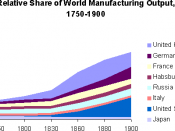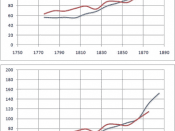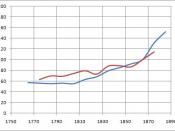Title: Women's roles prior to and during the evolution of the industrial revolution in England.
Introduction: Women prior to the industrial revolution were recognized as valuable contributors to the wealth of the nation, they were central in the textile and cheese making industry. This was to change drastically as the disappearance of "traditional" aspects of society evolved into the process called industrial revolution. New technology and capitalistic organization removed women from the primary role in production and deprived them of an accessible source of income. There was an abundant supply of unemployed women who became an exploitable pool of cheap labor. So women in need of income were subject to take low paying jobs in order to make a "living wage." By the 1830's the popular notion was that women's place was in the home making up a majority of domestic service. This allowed relations of difference and subordination between the women of different classes middle and working class to thrive.
Isolated by these ideologies and rigid social class distinctions, the lower class began to resent the industrialist that employed them. Engaging in acts of carousing and debauched behavior that were rebellious social statements emphasizing the lower classes rejection of the hypocritical social restraint the middle class attained to, dividing the classes and women's roles for many decades following the early 1800's.
Leading up to the industrial revolution women worked everywhere, they worked as rural labors and servants .Women helped produce the nations food supply. Their skill in the dairy was "undisputed and universally acclaimed." The women also did the spinning, knitting, weaving, stitching, and lace making, that supported its own trade both domestic and foreign. This was based on the traditional Agrarian economy in which everyone worked the land together in common. This meant part of a community using...


